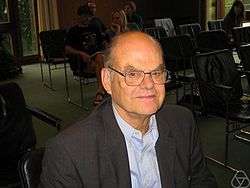John G. Thompson
John Griggs Thompson (born October 13, 1932) is a mathematician at the University of Florida noted for his work in the field of finite groups. He was awarded the Fields Medal in 1970, the Wolf Prize in 1992 and the 2008 Abel Prize.
John Thompson | |
|---|---|
 John Thompson in 2007 | |
| Born | October 13, 1932 Ottawa, Kansas, U.S. |
| Nationality | American |
| Alma mater | Yale University (B.A. 1955) University of Chicago (Ph.D. 1959) |
| Awards | Cole Prize (1965) Fields Medal (1970) Fellow of the Royal Society (1979) Senior Berwick Prize (1982) Sylvester Medal (1985) Wolf Prize (1992) Médaille Poincaré (1992)[1][2] National Medal of Science (2000) Abel Prize (2008) De Morgan Medal (2013) |
| Scientific career | |
| Fields | Group theory |
| Institutions | Harvard University (1961–62) University of Chicago (1962–68) University of Cambridge (1968–93) University of Florida (1993–present) |
| Thesis | A Proof that a Finite Group with a Fixed-Point-Free Automorphism of Prime Order is Nilpotent (1959) |
| Doctoral advisor | Saunders Mac Lane |
| Doctoral students | R. L. Griess Richard Lyons Charles Sims Nick Patterson |
Biography
He received his B.A. from Yale University in 1955 and his doctorate from the University of Chicago in 1959 under the supervision of Saunders Mac Lane. After spending some time on the Mathematics faculty at the University of Chicago, he moved in 1970 to the Rouse Ball Professorship in Mathematics at the University of Cambridge, England, and later moved to the Mathematics Department of the University of Florida as a Graduate Research Professor. He is currently a Professor Emeritus of Pure Mathematics at the University of Cambridge, and professor of mathematics at the University of Florida. He received the Abel Prize 2008 together with Jacques Tits.[3]
Work
Thompson's doctoral thesis introduced new techniques, and included the solution of a problem in finite group theory which had stood for around sixty years, the nilpotency of Frobenius kernels. At the time, this achievement was noted in The New York Times.[4]
Thompson became a figure in the progress toward the classification of finite simple groups. In 1963, he and Walter Feit proved that all nonabelian finite simple groups are of even order (the Odd Order Paper, filling a whole issue of the Pacific Journal of Mathematics). This work was recognised by the award of the 1965 Cole Prize in Algebra of the American Mathematical Society. His N-group papers classified all finite simple groups for which the normalizer of every non-identity solvable subgroup is solvable. This included, as a by-product, the classification of all minimal finite simple groups (simple groups for which every proper subgroup is solvable). This work had some influence on later developments in the classification of finite simple groups, and was quoted in the citation by Richard Brauer for the award of Thompson's Fields Medal in 1970 (Proceedings of the International Congress of Mathematicians, Nice, France, 1970).
The Thompson group Th is one of the 26 sporadic finite simple groups. Thompson also made major contributions to the inverse Galois problem. He found a criterion for a finite group to be a Galois group, that in particular implies that the monster simple group is a Galois group.
Awards
In 1971, Thompson was elected to the United States National Academy of Sciences. In 1982, he was awarded the Senior Berwick Prize of the London Mathematical Society, and in 1988, he received the honorary degree of Doctor of Science from the University of Oxford. Thompson was awarded the United States National Medal of Science in 2000.[5] He is a Fellow of the Royal Society (United Kingdom), and a recipient of its Sylvester Medal in 1985.[6] He is a member of the Norwegian Academy of Science and Letters.[7]
See also
References
- Thompson, John Griggs — serge.mehl.free.fr
- Liste des 122 fondations Archived 2014-10-06 at the Wayback Machine. The médaille Poincaré awarded by the French Academy of Sciences was eliminated in 1997 in favor of the Grande Médaille.
- "Thompson and Tits share the Abel Prize for 2008". Norwegian Academy of Science and Letters. 2008-05-17. Archived from the original on 2008-05-20. Retrieved 2008-05-20.
The Norwegian Academy of Science and Letters has decided to award the Abel Prize for 2008 to John Griggs Thompson, University of Florida and Jacques Tits, Collège de France. This was announced by the Academy's President, Ole Didrik Lærum, at a press conference in Oslo today. Thompson and Tits receives the Abel Prize "for their profound achievements in algebra and in particular for shaping modern group theory".
- http://www.cecm.sfu.ca/organics/papers/lam/paper/html/NYTimes.html New York Times article, April 26, 1959.
- "John Griggs Thompson". University of St. Andrews. Retrieved 24 October 2016.
- "Royal Society Sylvester Medalists". Retrieved 2 March 2014.
- "Gruppe 1: Matematiske fag" (in Norwegian). Norwegian Academy of Science and Letters. Archived from the original on 10 November 2013. Retrieved 7 October 2010.